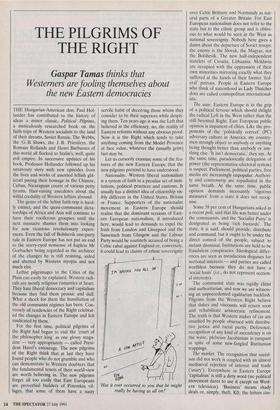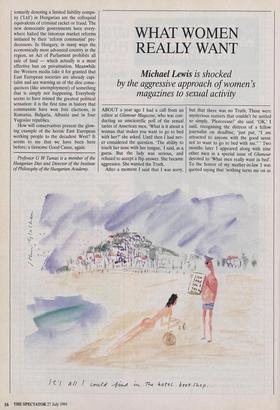THE PILGRIMS OF THE RIGHT
Gaspar Tamas thinks that
Westerners are fooling themselves about the new Eastern democracies
THE Hungarian-American don, Paul Hol- lander has contributed to the history of ideas a minor classic, Political Pilgrims, a meticulously researched book on the faith-trips of Western socialists to the land of their dreams, Soviet Russia. The Webbs, the G. B. Shaws, the J. B. Priestleys, the Romain Rollands and Henri Barbusses of this world all flocked to Stalin's, well, quite evil empire. In successive updates of his book, Professor Hollander followed up his unsavoury story with new episodes from the lives and works of assorted leftish glit- terati paying their homage in the Chinese, Cuban, Nicaraguan courts of various petty tyrants. Hair-raising anecdotes about the wilful credulity of Western leftists abound.
The genre of the leftist faith-trip is hard- ly extinct, and the quasi-communist dicta- torships of Africa and Asia will continue to have their vociferous groupies until the next massacre shames them into looking for new vicarious revolutionary experi- ences. Even the fall of Bolshevik one-party rule in Eastern Europe has not put an end to the starry-eyed nonsense of hapless Mr Gorbachev being regarded as the architect of the changes he is still resisting, aided and abetted by Western myopia and not much else.
Leftist pilgrimages to the Cities of the Plain can easily be explained. Western radi- cals are mostly religious romantics at heart. They hate liberal democracy and capitalism because they find them prosaic and dull. What a shock for them the humiliation of the old communist regimes has been. Con- versely all tendencies of the Right celebrat- ed the changes in Eastern Europe and felt vindicated by them.
For the first time, political pilgrims of the Right had begun to visit the 'court of the philosopher king' as one glossy maga- zine — very appropriately — called Presi- dent Havel's entourage. The new pilgrims of the Right think that at last they have found people who do not grumble and who can demonstrate to Western doubters that the fundamental tenets of their world-view are worth believing in. The new pilgrims forget all too easily that East Europeans are proverbial builders of Potemkin vil- lages, that some of them have a nasty servile habit of deceiving those whom they consider to be their superiors while despis- ing them. Ten years ago it was the Left that believed in the efficiency, no, the reality of Eastern reforms without any obvious proof. Now it is the Right which tends to take anything coming from the Model Province at face value, whatever the (usually grim), fact may be.
Let us cursorily examine some of the fea- tures of the new Eastern Europe that the new pilgrims pretend to have understood.
Nationality. Western liberal nationalism is a system of faith in a peculiar set of insti- tutions, political practices and customs. It usually has a distinct idea of citizenship vis- ibly different in the United States, Britain or France. Supporters of the nationalist movement in Eastern Europe should realise that the dominant versions of East- ern European nationalism, if introduced here, would lead to demands to expel the Irish from London and Liverpool and the Sassenach from Glasgow and the Labour Party would be routinely accused of being a Celtic cabal against England or, conversely, it could lead to claims of ethnic sovereignty Was it ever occurred to you that he might really be having us all on?' over Celtic Brittany and Normandy as nat- ural parts of a Greater Britain. For East European nationalism does not refer to the state but to the ethnic group and is oblivi- ous to what would be seen in the West as national sovereignty. Nobody here gives a damn about the departure of Soviet troops: the enemy is the Slovak, the Magyar, not the Bolshevik. The new half-independent statelets of Croatia, Lithuania, Moldavia are occupied with the oppression of their own minorities mirroring exactly what they suffered at the hands of their former 'fed- eral' patrons. People in Eastern Europe who think of nationhood as Lady Thatcher does are called cosmopolitan international- ists.
The state. Eastern Europe is in the grip of a political fervour which should delight the radical Left in the West rather than the still besotted Right. East European public opinion is impatient of elites. Like the pro- ponents of the 'politically correct' (PC) adversary culture in America, my country- men strongly object to anybody or anything being thought better than anybody or any- thing else. 'It isn't democratic,' they say. At the same time, paradoxically delegation of power (the rcpresentative-electoral system) is suspect. Parliament, political parties, free media are increasingly unpopular. Authori- ty and controversy are repudiated in the same breath. At the same time, public opinion demands incessantly 'vigorous measures' from a state it does not recog- nise.
Some 58 per cent of Hungarians asked in a recent poll, said that life was better under the communists, and the 'Socialist Party' is denigrated as being 'rich bastards'. The state, it is said, should provide, distribute and command, but it ought to be under the direct control of the people, subject to instant dismissal. Institutions are held to be fraudulent conspiracies. Ideological differ- ences are seen as mendacious disguises for sectional interests — and parties are called worthless because they do not have a `social basis' (i.e., do not represent section- al interests).
The communist state was rigidly elitist and authoritarian, and now we are witness- ing an unprecedented egalitarian backlash. Pilgrims from the Western Right believe that dukes and viscounts will return soon and rehabilitate aristocratic refinement. The truth is that Western makes of car are smashed by people obsessed with distribu- tive justice and racial purity. Deference, recognition of any kind of ascendency is on the wane, plebeian Jacobinism is rampant in spite of some new-fangled Ruritanian trappings.
The market. The recognition that social- ism did not work is coupled with an almost mediaeval rejection of interest and trade (`usury'). Everywhere in Eastern Europe `capitalism' is still a dirty word (no political movement dares to use it except on West- ern television). 'Business' means shady deals or, simply, theft. Kft, the letters cus-
tomarily denoting a limited liability compa- ny (`Ltd) in Hungarian are the colloquial equivalents of criminal racket or fraud. The new democratic governments have every- where halted the timorous market reforms initiated by their 'reform communist' pre- decessors. In Hungary, in many ways the economically most advanced country in the region, an Act of Parliament prohibits all sale of land — which actually is a most effective ban on privatisation. Meanwhile the Western media take it for granted that East European societies are already capi- talist and are warning us of the dire conse- quences (like unemployment) of something that is simply not happening. Everybody seems to have missed the greatest political sensation: it is the first time in history that communists have won free elections, in Rumania, Bulgaria, Albania and in four Yugoslav republics.
How will conservatives present the glow- ing example of the heroic East European working people to the decadent West? It seems to me that we have been here before; a tiresome Good Cause, again.
Professor G M Tamas is a member of the Hungarian Diet and Director of the Institute of Philosophy of the Hungarian Academy.



















































 Previous page
Previous page